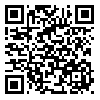Volume 25 - Supplementary
J Birjand Univ Med Sci. 2018, 25 - Supplementary: 126-134 |
Back to browse issues page
Download citation:
BibTeX | RIS | EndNote | Medlars | ProCite | Reference Manager | RefWorks
Send citation to:



BibTeX | RIS | EndNote | Medlars | ProCite | Reference Manager | RefWorks
Send citation to:
Mousavinezhad S H, Mahdizadeh I, Salehabadi S. Comparison of Academic Self-efficacy, Academic Engagement and Academic Performance Between Birjand University of Teachers and Birjand University of Medical Sciences. J Birjand Univ Med Sci. 2018; 25 :126-134
URL: http://journal.bums.ac.ir/article-1-2434-en.html
URL: http://journal.bums.ac.ir/article-1-2434-en.html
1- Farhangian Pardis of Shahid Bahonar University of Birjand, Birjand, Iran
2- Farhangian Pardis of Shahid Bahonar University of Birjand, Birjand, Iran. , mahdizadeh_iraj45@cfu.ac.ir
3- Department of Medical, Shahid Beheshti University of Medical Sciences, Tehran, Iran.
2- Farhangian Pardis of Shahid Bahonar University of Birjand, Birjand, Iran. , mahdizadeh_iraj45@cfu.ac.ir
3- Department of Medical, Shahid Beheshti University of Medical Sciences, Tehran, Iran.
Abstract: (5575 Views)
Background and Aim: Self-efficacy means an individuals perception of his ability to perform an activity and educational engagement is the quality of an effort that individuals spend on purpose-oriented activities. Both variables are the most important indicators of the quality of education. Therefore, in this study, in addition to comparing these indices in two universities such as Birjand University of Medical Sciences and Teachers university, the predictive value of these indicators in the academic performance of students has been studied.
Materials and Methods: This study is a descriptive-comparative research. The statistical population of the study consisted of all students entering the years 2014-17 of the University of Medical Sciences and University of Teachers. a sample size, According to the Cochran formula, 180 students were selected by stratified random sampling method. A two-part questionnaire including self-efficacy questionnaire and academic engagement was used to collect data. students performance was also measured based on their overall grade. Data were analyzed by SPSS software (version 24), using Kolmogorov-Smirnov statistical tests, t and regression.
Results: In this study, totally 180 students with an average age of 20.7 ± 1.27 were from teacher students (110) and medical students (70). Comparison of the average of academic self-efficacy showed that teacher students had higher academic self-efficacy (P <0.001). There was no significant difference in the comparison of educational involvement among the two groups (P = 0.476). Beta coefficient of academic self-efficacy in medical students has a larger contribution to predicting academic performance.
Conclusion: The results of this study showed that the academic self-efficacy variable is one of the predictors of academic performance. Also, due to the findings, more and deeper research is needed on academic self-efficacy variables and academic engagement in the two groups.
Materials and Methods: This study is a descriptive-comparative research. The statistical population of the study consisted of all students entering the years 2014-17 of the University of Medical Sciences and University of Teachers. a sample size, According to the Cochran formula, 180 students were selected by stratified random sampling method. A two-part questionnaire including self-efficacy questionnaire and academic engagement was used to collect data. students performance was also measured based on their overall grade. Data were analyzed by SPSS software (version 24), using Kolmogorov-Smirnov statistical tests, t and regression.
Results: In this study, totally 180 students with an average age of 20.7 ± 1.27 were from teacher students (110) and medical students (70). Comparison of the average of academic self-efficacy showed that teacher students had higher academic self-efficacy (P <0.001). There was no significant difference in the comparison of educational involvement among the two groups (P = 0.476). Beta coefficient of academic self-efficacy in medical students has a larger contribution to predicting academic performance.
Conclusion: The results of this study showed that the academic self-efficacy variable is one of the predictors of academic performance. Also, due to the findings, more and deeper research is needed on academic self-efficacy variables and academic engagement in the two groups.
Type of Study: Original Article |
Subject:
Medical Education
Received: 2018/01/28 | Accepted: 2018/04/8 | ePublished: 2018/09/5
Received: 2018/01/28 | Accepted: 2018/04/8 | ePublished: 2018/09/5
Send email to the article author
| Rights and permissions | |
 |
This work is licensed under a Creative Commons Attribution-NonCommercial 4.0 International License. |





